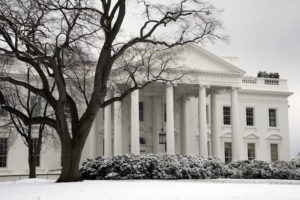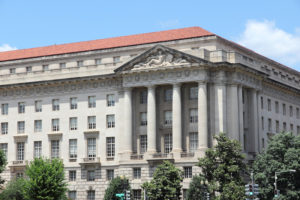
Ninth Circuit rules Second Amendment protects right to carry a gun in public, DOE expedites permitting of natural gas exports, and more…
IN THE NEWS
- The U.S. Court of Appeals for the Ninth Circuit ruled that a Hawaii statute unconstitutionally limited the issuance of open-carry licenses. Writing for the majority, Judge Diarmuid O’Scannlain stated that “the Second Amendment does protect a right to carry a firearm in public for self-defense” in spite of policy arguments to the contrary. In dissent, Judge Richard Clifton argued that “the Supreme Court in Heller expressly noted that the right secured by the Second Amendment is ‘not unlimited,’” and that Hawaii’s licensing scheme was based on a “legitimate interest in promoting public safety.”
- The U.S. Department of Energy (DOE) announced a rule that would provide expedited permitting of small-scale natural gas exports. The rule caps these exports at 51.75 billion cubic feet per year, and it mainly affects exports to countries in Central America, South America, and the Caribbean. DOE Secretary Rick Perry stated that the rule “will further unleash American energy by reducing the regulatory burden on American businesses.”
- The Federal Communications Commission (FCC) announced its intention to revise existing rules governing children’s television programming. The FCC stated that the proposed modifications were in response to “dramatic changes” in the television marketplace since the original rules were adopted “more than 20 years ago.” The FCC requested input on several aspects of the new rules, including the content, length, and scheduling of children’s television programming, and will accept comments until September 24, 2018.
- New Jersey Attorney General Gurbir S. Grewal directed prosecutors in the state to delay prosecution on marijuana-related offenses until September 4, 2018. The announcement came after a memorandum from Jersey City’s Chief Prosecutor Jacob V. Hudnut purported to decriminalize marijuana, which Grewal declared invalid as “an improper exercise” of municipal authority. Against the background of Governor Phil Murphy’s (D) initiative to legalize marijuana statewide, Grewal announced the formation of a “working group” to help develop “a statewide directive” concerning the prosecution of marijuana-related offenses.
- The U.S. Department of Education proposed replacing the Obama-era Borrower Defense Rule with new policies governing student loan forgiveness. U.S. Secretary of Education Betsy DeVos stated that her focus “has been and remains on protecting students from fraud.” In contrast, Jen Mishory, a senior fellow at The Century Foundation, claimed that the rule “will remove significant protections for students taken advantage of by predatory for-profit colleges.”
- The National Rifle Association and the Second Amendment Foundation (SAF) filed a lawsuit against the City of Seattle, stating that a firearm “safe storage” ordinance—which required gun owners to secure their firearms in a locked container when not under their control—was invalid. SAF asserted that Seattle cannot issue firearm regulations because a Washington State statute provides that the “state legislature has sole authority to adopt gun laws.” The non-profit Everytown for Gun Safety praised the ordinance and announced that it would “represent the City of Seattle on a pro-bono basis.”
- The U.S. Environmental Protection Agency (EPA) announced that farmers would be exempt from reporting emissions derived from animal waste. EPA Acting Administrator Andrew Wheeler described the previous requirement as “an undue reporting burden on American agriculture” and emphasized EPA’s commitment “to providing regulatory clarity and certainty to farmers and ranchers.”
- China’s State Council launched an investigation into whether Changchun Changsheng Bio-tech, a major vaccine manufacturer, faked production and inspection records for its rabies vaccine. The company’s alleged wrongdoing crossed a “moral line,” Premier Li Keqiang said. In response, Changchun Changsheng reportedly issued a public apology and voluntarily recalled all of its rabies vaccines.
- The Trump Administration reportedly plans to issue a proposal to freeze fuel-efficiency standards for six years and challenge state tailpipe standards, like California’s, that are inconsistent with the federal freeze. The reported proposal follows the EPA’s April recommendation to reevaluate the Obama Administration’s emission standards. California Attorney General Xavier Becerra criticized the EPA’s recommendation, stating that California was “ready to file suit if needed to protect these critical standards and to fight the Administration’s war on our environment.”
WHAT WE’RE READING THIS WEEK
- Although code-based “smart contracts” promise a financial ecosystem without regulation, “the absence of coded governance protections is troubling,” said Shaanan Cohney of the University of Pennsylvania Department of Computer and Information Science, David A. Hoffman and Jeremy Sklaroff of the University of Pennsylvania Law School, and David Wishnick of Penn Law’s Center for Technology, Innovation and Competition in an article. Specifically, the authors found that the promises made by promoters of initial coin offerings (ICOs) often do not match the code in the smart contracts behind the ICOs. The authors suggested that courts and regulators build up the capability to assess the quality of smart contracts and whether they comply with the law.
- In a recent article, Valerie Brannon, legislative attorney for Congressional Research Service, explored whether the President can circumvent the notice-and-comment procedures of the Administrative Procedure Act (APA) by amending federal rules with executive orders. Brannon posited that although other laws may limit presidential rulemaking authority, APA’s procedural requirements do not apply to executive orders because they are “presidential action” rather than “agency action.” Brannon concluded, however, that any agency action taken to comply with executive orders would likely be subject to APA requirements.
- In light of global population growth and increasing demand for food, Marie C. Boyd of the University of South Carolina School of Law discussed the U.S. Food and Drug Administration’s (FDA) regulation of insects as food in an article for the Yale Law & Policy Review. Boyd outlined benefits of using insects as food, examined FDA regulations on insects as food contaminants, and considered possible avenues for regulating them as food. Boyd noted that “by recognizing insects as food and regulating them as such, FDA may help to erode the stigma surrounding these products and may help to advance the study and development of insects as food.”



